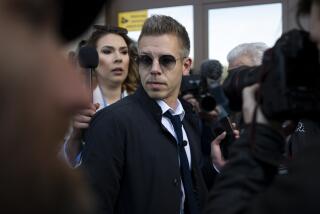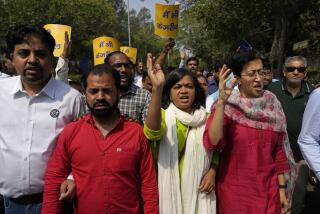Three Turkish Cabinet ministers resign amid corruption investigation
GAZIANTEP, Turkey — Three senior ministers in Turkey’s Cabinet resigned Wednesday as a secret 14-month corruption investigation of bid rigging and bribery intensified, threatening to topple the ruling Justice and Development Party, or AKP.
The graft inquiry presents the most serious challenge to the legitimacy of Prime Minister Recep Tayyip Erdogan’s government since opposition protests six months ago. The investigation has netted millions of dollars in cash stashed away in shoe boxes, exposed sanctions-breaking deals with Iran and revealed bribes paid to allow construction in protected areas.
Outrage has morphed into protest, with thousands taking to the streets over the weekend after a series of dawn raids last week that targeted high-profile businessmen, the mayor of Istanbul’s Fatih district, bureaucrats and the sons of three prominent ministers.
Turkish Economy Minister Zafer Caglayan, Interior Minister Muammer Guler and Environment and Urbanization Minister Erdogan Bayraktar resigned from their posts Wednesday. Each of the ministers has a son who has been arrested in the investigation.
Statements from Caglayan and Guler — whom some call “chemical Guler” for his part in putting down anti-government protests with tear gas this year — reflected the rhetoric of Erdogan, who has framed the corruption investigation as an international conspiracy led by a “dark alliance” of “traitors and spies.”
Bayraktar, however, shifted the focus to Erdogan, saying that a majority of the construction plans involved in the corruption investigation had been approved by the prime minister, Turkish news reports said.
“I believe that the prime minister should step down as well in order to relieve the Turkish public,” Bayraktar said, according to the newspaper Today’s Zaman.
In the last week, Erdogan reportedly has overseen the firing of 500 police officers investigating the corruption allegations. They include Istanbul Police Chief Huseyin Capkin and Nazmi Ardic, who heads the organized crime branch. It is believed that the long-running investigation was conducted without Erdogan’s knowledge.
“His response has been complete denial of any wrongdoing on the part of the ministers or their families. He has not acknowledged or said a single word about corruption,” said Faruk Logoglu, vice chairman of the main opposition Republican People’s Party, or CHP. “Instead he began threatening prosecutors and saying it was the work of gangs. This is entirely inappropriate and contravenes due process.”
The frenzied purge has prompted allegations of political meddling and prompted speculation that Erdogan will bulldoze the inquiry.
“There is growing concern that the actions of the government could be considered as interference with the ongoing investigation,” said Oya Ozarslan of Transparency International’s Turkey chapter.
The AKP, a center-right Islamic party that has overseen rapid economic growth, came to power more than a decade ago after a severe economic crisis, years of fiscal irresponsibility and government corruption. It championed clean governance, promising to stamp out corruption.
As such, the scandal cuts to the core of the AKP’s image as Turkey’s moral compass.
“I am angry but not surprised. I wish I could believe that Erdogan’s government really are [good] Muslims who do all the good things a religion can,” said Dunya Ergun, a teacher in Istanbul. “But I have never believed that, and I have been proved right.”
The investigation has widely been interpreted as part of a rift between the AKP and supporters of the U.S.-based cleric Fethullah Gulen, whose supporters are believed to have penetrated the Turkish police and judiciary.
The organization was a staunch ally of the AKP for much of the last decade, mobilizing its supporters and helping the party win three consecutive elections. However, revelations that the country’s intelligence services may have been profiling Gulen’s supporters, and Erdogan’s increasing authoritarianism and moves against the movement’s economic interests — notably private schools — have soured the relationship.
The Gulen camp is seen as more Western-oriented, with fairly moderate Islamist credentials, while the AKP veers toward the more religiously fundamentalist, anti-Western Muslim Brotherhood.
The two sides now appear to be in open warfare, with corruption a key issue, as Turkey moves toward elections next year.
A number of election billboards were recently censured for being too critical of Erdogan. One of the billboards stated: “If the citizen is paying taxes, then the government should give an account of its spending.”
The AKP government has defied repeated requests from opposition parties to provide accounts of how it spends public funds — amid allegations of fiscal irresponsibility and nepotism — and recently passed regulations that allow government institutions three years to provide information of spending to auditors.
Johnson is a special correspondent.
More to Read
Start your day right
Sign up for Essential California for news, features and recommendations from the L.A. Times and beyond in your inbox six days a week.
You may occasionally receive promotional content from the Los Angeles Times.






